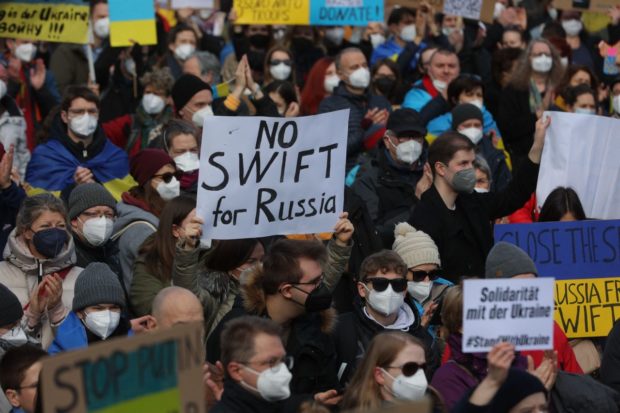
A protester holds a placard reading “No SWIFT for Russia” during a rally against Russia’s invasion of Ukraine on Saturday in Frankfurt am Main, western Germany. (AFP)
SEOUL — South Korea decided to prohibit exports of strategic materials to Russia, joining the US and other countries in imposing tough restrictions following the invasion of Ukraine, the Ministry of Foreign Affairs said Monday.
The government has notified the US of its related decisions via a diplomatic channel, the ministry said.
Seoul announced its first set of economic measures targeting Russia in the wake of the ongoing crisis in Ukraine. The government will strengthen export control review, which will effectively ban the export of strategic materials. They include items such as conventional weapons, goods and technologies that could make weapons of mass destruction and missiles, among others. These are materials that are listed under multilateral export control regimes, including the Missile Technology Control Regime, Wassenaar Arrangement, Nuclear Suppliers Group and Australia Group.
As for sanctioning what are classified as “non-strategic materials,” the government will make a decision soon following evaluation by related ministries. These materials include 57 items that the US unilaterally sanctioned last week, including semiconductors, computers, telecommunications, information security systems, lasers and sensors, among others.
The ministry said it also decided to join the US and other allies in disconnecting key Russian banks’ access to the Society for Worldwide Interbank Financial Telecommunication, an international payment system used by thousands of financial institutions globally. Russia’s exclusion from SWIFT is seen as a move aimed at severing the country from much of the global financial system.
South Korean President Moon Jae-in announced last week that Seoul would join international sanctions on Russia.
On Monday, Moon told officials that the government needs to come up with contingency measures to tackle the impact of sanctions on Russia, according to Cheong Wa Dae spokesperson Park Kyung-mee.
He was also briefed that there would be little impact on global supply chains in regards to energy and grain for a short-term supply, but the impact could become gradually apparent. Moon urged the government to establish a hotline with companies to monitor supply chain issues and stabilize supply through import from other countries, and expand inventory.
The president also told officials to devise a plan for providing humanitarian aid for Ukraine.
RELATED STORIES
Seoul advises S. Korean nationals in 15 Ukraine regions to leave
France says sanctions will cause ‘collapse’ of Russian economy
US to impose sanctions on Russia’s Putin over invasion of Ukraine
Kremlin says Russia will impose retaliatory sanctions on West
U.S. hits Russian banks, elites with sanctions over Ukraine crisis